21 November 2008--The Façade of Stability
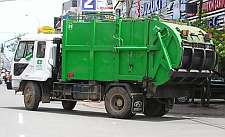 As a follow-up to the previous article about Reporters Without Borders, here is an excerpt from "Human Rights in the Façade of Stability," a report by LICADHO, a national human rights organization:
As a follow-up to the previous article about Reporters Without Borders, here is an excerpt from "Human Rights in the Façade of Stability," a report by LICADHO, a national human rights organization:
The Prime Minister has not followed through on his surprise call shortly before the CG (Consultative Group) meeting to decriminalise defamation. While welcome moves were subsequently made to remove prison sentences, defamation remains a criminal offense for which people can be arrested, convicted, and subject to criminal fines. In addition, the removal of prison sentences does not eliminate the government's legal means to imprison its critics. Some of the civil society leaders arrested over the border affair were charged not just with defamation but also with incitement (despite a gross lack of evidence that they had incited anyone to commit any crime), and Mam Sonando also with disinformation--both of which carry even longer prison sentences than the criminal defamation charges. Furthermore, as Cambodian law allows for the imprisonment of debtors, there is nothing to prevent the courts imposing unreasonably high financial penalties in defamation cases and thus ensuring prison time.
10 November 2008--Another Violation of Cambodian Rights
Reporters Without Borders, in their latest report, has ranked Cambodia's press freedom as 126th of the 173 countries they assessed. This was a precipitous drop of 41 places from last year! Reporters Without Borders evaluates factors that affect the journalists themselves, such as murder, imprisonment, physical attacks, and threats, and factors that affect the media, such as censorship, confiscation of newspapers, searches, and harassment. It also looks at questions of impunity, self-censorship, and free flow of information. This is the lowest ranking Cambodia has received since the press index was initiated seven years ago.
8 November 2008-- Recently Prime Minister Hun Sen brought up again the idea of an NGO law, saying that it is needed because NGOs need to be controlled and to account for the money flowing through them.
A ruling party lawmaker admitted the prime minister's remarks were aimed particularly at organizations challenging the government on de-forestation and the long-delayed anti-corruption law. Hun Sen's tactics are rather obvious. First, to divert attention from the government's failure at transparency and honesty and competency, accuse the watchdogs of the same offenses. But the Cambodian Ministry of Foreign Affairs already collects information, each quarter, from the International NGOs—the most vocal critics of the government—about how their money is used. They don't ask where it comes from, which is their fault, not that of the NGOs. Maybe the MFA recognizes it's none of their business. Secondly, the government is trying to intimidate the NGOs to silence them and limit their oversight of the ruling party and its administration. NGOs and opposition groups are concerned about the proposed law because of its ability to limit their activities and usefulness. The law proposal has been around for a while. A 2006 draft was severely criticized by groups because it would have required them to channel all their funds through the Finance Ministry. What a fiasco that would be! As it is now, the financial offices of the government are accused of stealing government funds meant to pay government workers throughout the country. For example, district-level officers must pay a bribe to get their budgeted money from the central government. The workers at the lowest end of the pay system are too frequently not paid on time, paid only partially, or not paid at all.

NGOs demand others to respect the law.... They talk about transparency and accountability for income, but where do those NGOs get their money from and for what? Hun Sen asked....
30 October 2008--More Misconduct Headlines 
Click here to see still more headlines of official misconduct in Cambodia.
21 October 2008--Tensions with Thailand
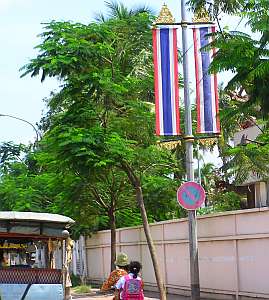
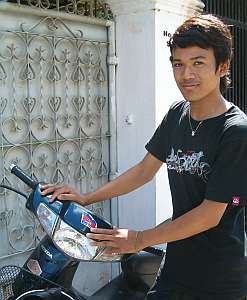
 Thailand has had no real government since the coup that deposed Thaksin Shinawatra, and for the generals in charge, shooting at Cambodia on the border is preferable to the demonstators' shooting at them. In Cambodia, the paranoid insecure CPP ruling party is delighted to have Preah Vihear taking the headlines, and the Prime Minister can show how "brave" he is to stand up to Thailand which is so much richer, more developed, more stable--more everything except corrupt--than Cambodia.
Thailand has had no real government since the coup that deposed Thaksin Shinawatra, and for the generals in charge, shooting at Cambodia on the border is preferable to the demonstators' shooting at them. In Cambodia, the paranoid insecure CPP ruling party is delighted to have Preah Vihear taking the headlines, and the Prime Minister can show how "brave" he is to stand up to Thailand which is so much richer, more developed, more stable--more everything except corrupt--than Cambodia.
Last weekend the new Thai prime minister was to come to Cambodia to negotiate with the Cambodian prime minister (thus the street banners above) but at the last minute the political situation in Bangkok was so unstable he didn't want to leave the country. In the meanwhile, Punya, the motordupe driver (right photo) puts a new Cambodia flag decal on his motorcycle believing all the nonsense his government feeds him.
9 October 2008--Would you trust these guys?
Maybe that quote makes more sense in Khmer, but should anyone trust government officials in Cambodia? In May an unidentified aircraft exploded over the southern Cambodian coast, showering debris from Vietnam to the city of Sihanoukville. Fishermen and farmers brought pieces of metal wreckage to the local police. But, again from the Cambodia Daily:
These are the people running the country. Are they lying or oblivious or just incompetent? They probably can't be that stupid. Whatever the cause, it's scary that people like that are in charge of this nation.
Local officials in Cambodia have been noncommittal about whether there is cause for concern over the milk products from China tainted with melamine. According to the Cambodia Daily:
 Health Minister Mam Bun Heng declined to comment and referred questions to [the customs department and the Ministry of Commerce's Camcontrol department]. Customs Director Pen Simon could not be reached for comment, nor could Camcontrol Director-General Mak Pichrith or his deputy, Sum Narun.
Health Minister Mam Bun Heng declined to comment and referred questions to [the customs department and the Ministry of Commerce's Camcontrol department]. Customs Director Pen Simon could not be reached for comment, nor could Camcontrol Director-General Mak Pichrith or his deputy, Sum Narun.
Prime Minister Hun Sen...dismissed concerns about milk in Cambodia, voicing reassurances to the National Assembly following the formation of the new government.
"We have a permanent framework to permanently examine the food safety and to protect the bad effects concerning food, animal disease, disease outbreak, so there is no surprise about the situation of the Chinese products."
However, Cambodia officials reiterated...their claims from the previous day that there was no evidence of a downed aircraft...Mao Havanall, secretary of state for the State Secretariat for Civil Aviation, dismissed the incident as a "rumor" and reiterated...that air traffic control at Phnom Penh International Airport did not monitor any falling aircraft along the coast....The National Committee for Disaster Management will not be investigating the scene, Mao Havanall said, "because it's not a real story. It's just a rumor."
8 October 2008--More Misconduct Headlines
Click here to see still more headlines of official misconduct in Cambodia.

6 October 2008--UN Special Rapporteur
 Three weeks ago, Yash Ghai, the respected constitutional law scholar and professor at the University of Hong Kong resigned his position as Special Representative of the UN Secretary General for human rights in Cambodia after a tumultuous tenure in the post. The first special representative was appointed in 1993, and in his resignation letter Ghai noted that the Cambodia government had dismissed much of the work of the representatives during the past fifteen years. International scrutiny will continue, however, as the UN Human Rights Council in Geneva approved a resolution appointing a new representative. The head of Human Rights Watch in Geneva noted the Council had sent Cambodia a strong message and said: "The council will renew the mandate on Cambodia because serious [human rights] problems persist in the country." [Photo from Hong Kong Democratic Foundation]
Three weeks ago, Yash Ghai, the respected constitutional law scholar and professor at the University of Hong Kong resigned his position as Special Representative of the UN Secretary General for human rights in Cambodia after a tumultuous tenure in the post. The first special representative was appointed in 1993, and in his resignation letter Ghai noted that the Cambodia government had dismissed much of the work of the representatives during the past fifteen years. International scrutiny will continue, however, as the UN Human Rights Council in Geneva approved a resolution appointing a new representative. The head of Human Rights Watch in Geneva noted the Council had sent Cambodia a strong message and said: "The council will renew the mandate on Cambodia because serious [human rights] problems persist in the country." [Photo from Hong Kong Democratic Foundation]
4 October 2008--Cambodian airline crash
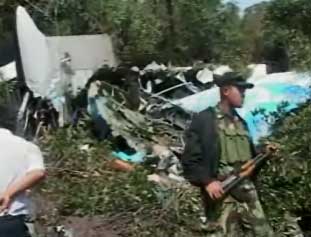 More than fifteen months ago, a PMT Air airplane with twenty-two people on board crashed in Cambodia on a flight from Siem Reap to Sihanoukville. There were no survivors and the families of the victims have yet to be compensated. An aviation safety expert based in the UK said it is unacceptable for families to wait years for compensation and noted "One of the things I would be wondering is if [PMT Air is] insured at all," even though the UN requires all commercial airlines to have insurance. An accident report on the crash noted that air traffic control warned the pilot, flying at 600 meters, that he was too low because of a 1,000+ meter mountain in the area, and the pilot replied "I know this terrain well" immediately before plowing into an 800-meter hill. Note the soldier investigating the crash site with an assault rifle, Cambodia's preferred tool for difficult situations. Photo from 1001crash.com
More than fifteen months ago, a PMT Air airplane with twenty-two people on board crashed in Cambodia on a flight from Siem Reap to Sihanoukville. There were no survivors and the families of the victims have yet to be compensated. An aviation safety expert based in the UK said it is unacceptable for families to wait years for compensation and noted "One of the things I would be wondering is if [PMT Air is] insured at all," even though the UN requires all commercial airlines to have insurance. An accident report on the crash noted that air traffic control warned the pilot, flying at 600 meters, that he was too low because of a 1,000+ meter mountain in the area, and the pilot replied "I know this terrain well" immediately before plowing into an 800-meter hill. Note the soldier investigating the crash site with an assault rifle, Cambodia's preferred tool for difficult situations. Photo from 1001crash.com
24 September 2008—Corruption: Getting Worse And as before, Cambodian government officials denounced the survey—which included polls by the World Bank, the Asian Development Bank, the Economic Intelligence Unit, and the Political and Economic Risk Consultancy—as biased and unfair. The head of the anti-corruption committee in Cambodia offered as proof of the survey's bias the fact that voters have just returned the ruling party to power. (Of course, he would not acknowledge that maybe there was corruption that helped them maintain power?) The ruling party's commitment to eliminating corruption can be gauged by the fact that the draft anti-corruption law introduced in 1994(!) has never been passed. It seems they've never gotten around to it. Or maybe they think there's no need for it? Obviously those who judge those things neutrally think differently. [Graphic from graphicreflections.org]
 For the third year in a row, Cambodia's ranking has fallen in the annual corruption survey by Transparency International. In this year's survey of the levels of corruption in 180 countries, Cambodia ranked 166. It was awarded a score of 1.8 (out of a possible 10), making it equal to Kyrgyzstan, Turkmenistan, Uzbekistan, and Zimbabwe.
For the third year in a row, Cambodia's ranking has fallen in the annual corruption survey by Transparency International. In this year's survey of the levels of corruption in 180 countries, Cambodia ranked 166. It was awarded a score of 1.8 (out of a possible 10), making it equal to Kyrgyzstan, Turkmenistan, Uzbekistan, and Zimbabwe.
20 September 2008--More Misconduct Headlines
Click here to see still more headlines of official misconduct in Cambodia.

25 May 2008--More Misconduct Headlines
Click here to see headlines of official misconduct in Cambodia.

15 May 2008--Honoring the King? This will be the first banknote to have the visage of the new king on it. Paper money printed after the defeat of the Khmer Rouge has been graced with the image of retired King Sinanouk up to now.
 The prime minister of Cambodia has announced that a new 20,000 riel banknote will be issued to honor the king for his birthday. I have been in Cambodia more than eight years and have never seen a 20,000 riel note. Why do we need a new one? In a country with a proper government seriously interested in the welfare of its people, there would be studies and discussion about the need for new currency. Here such a change is just announced. About five years ago, a 50 riel note was introduced but it basically went out of circulation within a year and is now mostly available only in banks. But officials must feel that exercises like this go down well with the mostly uneducated public so they continue.
The prime minister of Cambodia has announced that a new 20,000 riel banknote will be issued to honor the king for his birthday. I have been in Cambodia more than eight years and have never seen a 20,000 riel note. Why do we need a new one? In a country with a proper government seriously interested in the welfare of its people, there would be studies and discussion about the need for new currency. Here such a change is just announced. About five years ago, a 50 riel note was introduced but it basically went out of circulation within a year and is now mostly available only in banks. But officials must feel that exercises like this go down well with the mostly uneducated public so they continue.
14 May 2008--The King's Birthday
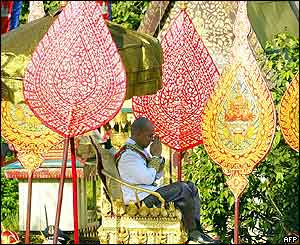 Today is the 55th birthday of the new King Sihamoni who ascended to the throne when his father, King Norodom Sihanouk, resigned three years ago. As I write this, I can hear the fireworks being set off on the waterfront by the Royal Palace. This is the second of three days of holidays established to honor the king. I had hoped that the new king would accept only one day for his birthday instead of the three traditionally celebrated for his father. Apparently tradition is too much, though, so now we have six days of birthday holidays--three for the reigning king and three for the retired king!
Today is the 55th birthday of the new King Sihamoni who ascended to the throne when his father, King Norodom Sihanouk, resigned three years ago. As I write this, I can hear the fireworks being set off on the waterfront by the Royal Palace. This is the second of three days of holidays established to honor the king. I had hoped that the new king would accept only one day for his birthday instead of the three traditionally celebrated for his father. Apparently tradition is too much, though, so now we have six days of birthday holidays--three for the reigning king and three for the retired king!
22 April 2008--Religious Diversity in Cambodia
Buddhism is the official state religion in Cambodia, a very prominent and obvious part of the social fabric, but other religions are represented, too. Islam has 277 mosques, mainly in one province, with about 320,000 Islamic believers. The Catholic Church has 25 churches and 52 other prayer venues, with a Catholic population of about 18,500. Other Christian denominations have 193 churches and 1,400 other prayer sites, and about 155,000 believers. The Baha'i faith has 7 prayer venues and 6,300 members, while the Cao Dai sect has two places for prayer for its 3,000 ethinic Vietnamese believers. The majority of the Buddhists belong to the Theravada Buddhism sect which has 55,500 monks and 4,300 pagodas. The other branch of Buddhism, Mahayana, has 90 pagodas and 22 smaller places for prayer. [This photograph is of a corridor in what was the old seminary in the pre-Khmer Rouge era. Today it is part of the Catholic compound that serves as one of two parishes in Phnom Penh.]
20 April 2008--We're No. 2!

It is common practice to see police on many street corners doing nothing except pulling people over for imagined offenses and extorting money. Sometimes it becomes institutionalized, as in this photograph, where a driver of an overloaded van coming into the city automatically slows down so his helper can hand a payoff to the police officer who comes out to meet each van.
18 April 2008--It's all relative... Citigroup, the United States' largest financial instituion and the parent of Citibank, announced today that it wrote off $5.1 billion in losses, due to the sub-prime mortgage fiasco, in the first quarter of this year! Compare this to the banking situation in Cambodia where in 2001 the government closed 11 commercial banks following new banking rules which raised the minimum capital requirement from $5 million to $13 million. Of the 30 banks in the country at the time, only 4 were able to meet the new requirement! A banking official announced at the time: "With this decision, we've solved the main problem in our bankng sector. What we are doing is to strengthen our banking sector by selecting only strong banks." It's debatable whether they succeeded. There are a number of new small banks like this one but it is amazing how many businesses--not individuals!--don't have bank accounts or any transactions with banks!

3 April 2008--Just what we need...
An article in The Phnom Penh Post noted that the number of luxury golf courses in Cambodia last year doubled to four and that officials hope to have six more by 2010. Two of the courses that opened in 2007, in Siem Reap, were PGA-level courses. Presently under construction are another Siem Reap course, three near Phnom Penh, one near the Vietnamese border, and one is planned near Sihanoukville. "Golf can attract more high-yield tourists," said the head of the Cambodia Golf Association. This is in a country where only 17% of the nation has electricity and where rice exports have been limited because there is fear there is not enough to feed the local populace.
8 February 2008--Continued Injustice
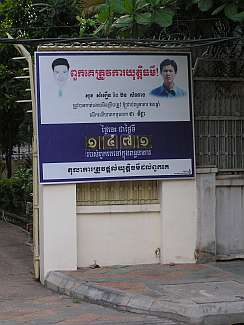 This is a sign outside a human rights organization in Phnom Penh with the pictures of two men, Born Samnang and Sok Sam Oeun, who were convicted of the murder of Chea Vichea, the president of the Free Trade Union in 2004. He was gunned down in January in broad daylight at a corner newspaper stand in the neighborhood where many of the Maryknollers lived. A week later Born and Sok were arrested, and in August they were convicted of his murder and sentenced to 20 years in prison even though witnesses verified they were elsewhere on the day of the killing. The newshop owner, who witnessed the killing, said the two did not do it. She later fled to Thailand for her own safety. Human rights groups support the innocence of the two and keep the issue in front of people with signs like this which are changed daily to indicate the number of days the two have been imprisoned. The Khmer numbers on this sign indicate 1471 days. The rights groups, family members, and other supporters held a ceremony marking the pair's fourth year of imprisonment.
This is a sign outside a human rights organization in Phnom Penh with the pictures of two men, Born Samnang and Sok Sam Oeun, who were convicted of the murder of Chea Vichea, the president of the Free Trade Union in 2004. He was gunned down in January in broad daylight at a corner newspaper stand in the neighborhood where many of the Maryknollers lived. A week later Born and Sok were arrested, and in August they were convicted of his murder and sentenced to 20 years in prison even though witnesses verified they were elsewhere on the day of the killing. The newshop owner, who witnessed the killing, said the two did not do it. She later fled to Thailand for her own safety. Human rights groups support the innocence of the two and keep the issue in front of people with signs like this which are changed daily to indicate the number of days the two have been imprisoned. The Khmer numbers on this sign indicate 1471 days. The rights groups, family members, and other supporters held a ceremony marking the pair's fourth year of imprisonment.
For some reason, the government has been introducing new laws about driving in the last year or so. The laws are certainly needed but why the government is promulgating them is another question. Usually the answer to such questions is that government officials will make money from the changes, not that they are for the common good or traffic safety. Following is an excerpt from a Letter to the Editor to the Cambodia Daily:
If one is patient, just wait and it will go away like the mirrors on motorbikes decree; the army license plate removal decree; the darkened windows on cars decree; and the change cars with right hand drive to left hand drive decree....  24 January 2008
24 January 2008
Probably one of the best metaphors for the corruption, lack of will, and incompetence in the government of Cambodia is the situation of driving laws. Basically there are no driving laws. There are some--very few--on the books, but people do not know them and none are enforced.
Decrees Here Are Not To Be Taken Seriously
I refer to the letter to the editor, "City's Order to Replace License Plates is Unjust"....
23 January 2008--Politics rather than truth
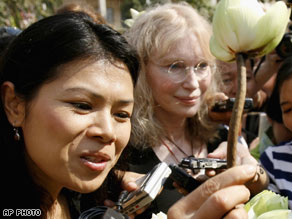 This past weekend, a memorial service for victims of genocide was blocked by the Cambodian government. Actress Mia Farrow and other activists went to the Tuol Sleng Museum, the torture center where victims were interrogated before being taken to the killing fields, to place flowers in memory of those who died under the Khmer Rouge. The Cambodian government is very sensitive about such observances because China supported the Khmer Rouge--as did the United States--and China is now one of Cambodia's staunchest allies. The police blocked off the streets leading to Tuol Sleng and even physically pushed away the small group who came to Cambodia as part of a seven-nation trip remembering all the victims of genocide. [Photo from Associated Press and CNN]
This past weekend, a memorial service for victims of genocide was blocked by the Cambodian government. Actress Mia Farrow and other activists went to the Tuol Sleng Museum, the torture center where victims were interrogated before being taken to the killing fields, to place flowers in memory of those who died under the Khmer Rouge. The Cambodian government is very sensitive about such observances because China supported the Khmer Rouge--as did the United States--and China is now one of Cambodia's staunchest allies. The police blocked off the streets leading to Tuol Sleng and even physically pushed away the small group who came to Cambodia as part of a seven-nation trip remembering all the victims of genocide. [Photo from Associated Press and CNN]